Through the Looking Glass
Three generations of Azerbaijanis on Lachin and the Armenians
Source: Modern.az
Modern.az conducts a survey of three generations (grandfather, grandmother, children and grandchildren) from Karabakh and seven regions surrounding it. This time, the respondents are former residents of Lachin.
The respondents were asked how and what they remember about Lachin.
First generation:
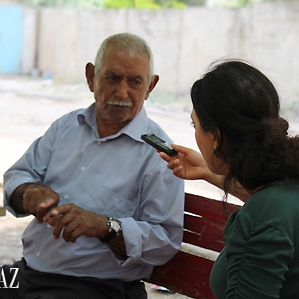 80-year-old Almamed, who lived in dormitory №2, was the only representative of his generation. On hearing about our plans, he said with pain in his heart:
80-year-old Almamed, who lived in dormitory №2, was the only representative of his generation. On hearing about our plans, he said with pain in his heart:
– Ay bala, 1, what are you saying, is anyone of my age alive now to talk about Lachin? Sometimes in my dreams I want to visit those places again. However, I can find no one of my age to share my memories. They all have passed away. (Sometimes he reproaches himself for having survived).
We were deceived and forced to leave our lands. They said that we would go to the town of Lachin and then come back. Otherwise, I would never leave my village. Sometimes I say to myself, “Oh Allah! I wish they returned those lands, and I rode my horse even once and took a stroll about my native places, and drank from springs.
Oh Allah! It would be better if I stayed there and died than lived here.”
Second generation:
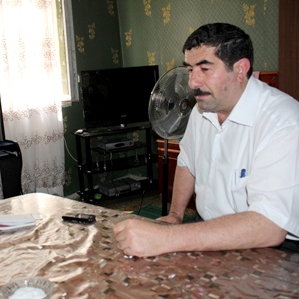 Mrs Farhanda is from the village of Gulabird, Lachin region. She is 49. She says she has been a refugee three times.
Mrs Farhanda is from the village of Gulabird, Lachin region. She is 49. She says she has been a refugee three times.
“At first, in 1992, we came to Sumgait, but could not live there. We came back to the village. Then the situation escalated again and I had to return to my relatives in Sumgait. My husband and brother died in Lachin.
We came back to our native region, but after the Armenians took Shushi, I came to Baku with my four children. My father brought us to this dormitory.”
Mrs Farhanda has nostalgic memories about her native home:
– In summer time, we stayed outdoors all day. We spent the time in the courtyard and vegetable garden planting, sowing and looking after. One could find even pigeon’s milk in our land. It would be better if we died and stayed there.
Mr Tahir calls Lachin an “eagle’s nest.”
– Lachin’s beauty can’t be forgotten. Fancy that, Lachin used to give 150,000 tons of meat, honey and milk to the country. I miss every single stone, every single tree, water and air there.
Mr Tahir, 51, currently a geography teacher, said that he knew about the planned treachery of the Armenians as early as when they were carving crosses2 on the rocks in Lachin. “With my geological hammer I turned those crosses into a half moon and star”.
In ordinary times we had close ties with the Armenians. They often came to our village.
But later, the Armenians defending us were killed in Khankendi. Propaganda was spread among us to the effect that those were poor places and it was necessary to leave them.
Earlier, the Armenians came for reconnaissance, brought foreign journalists with them and told them that Lachin is their land.
From early years, Armenian children said that Karabakh always belonged to them, that Sultan bek3 was a bad person, he oppressed the Armenians. This was how hostility and hatred towards the Turks4 was formed in Armenian children.
They also made intrigues against our patients. Thus, people operated on at Khankendi hospital had watches and scissors removed from their belly. It appears that they committed murders5 even in this way.
Third generation:
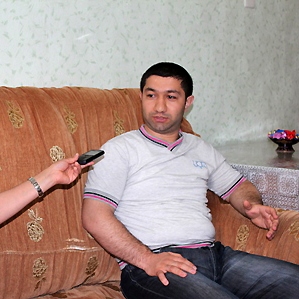 23-year-old Imran was 2 years old when his family left Lachin. His mother died when the bus overturned on the way.
23-year-old Imran was 2 years old when his family left Lachin. His mother died when the bus overturned on the way.
“To tell the truth, I remember nothing about Lachin. I can imagine it only with the help of what my father told me and what I read. I even keep an audio recording of my grandmother’s voice. Perhaps it will be of use to us some day. When I see pictures of Khojaly6 and read what Zori Balayan7 wrote, I think that this should not go unpunished. As for fear and terror before the Armenians among the youth, Mubariz Ibrahimov8 broke that stereotype. I don’t think that any fear remained after that.”
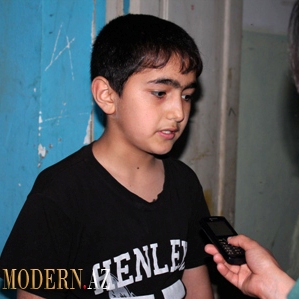 5th grade student Hismet is also from the village of Gulabird, Lachin region. We present his words without change:
5th grade student Hismet is also from the village of Gulabird, Lachin region. We present his words without change:
“Lachin is the place where my father and mother were born, it is my homeland. Now these places are in the hands of the mean Armenians. They are bad, cruel people. But they should not be feared. They are weak people and a weak state”.
– What do you write about Lachin in your compositions?
– I write about how we were expelled, I write about the beauty of my homeland.
– What rivers do you know in Lachin?
– My father told about River Hekeri. In order to take Lachin, we need a strong army to kill the Armenians and take back our lands.
– In your opinion, who loves Lachin more, any Armenian child or you?
– Of course me. For our lands are there, while they invent things.
– When will Lachin be ours?
– When we take it back. The time has come and we will gradually get what we want. When I grow up, I will be brave like Mubariz and will return our lands. If an Armenian child falls into my hands, I will kill him. I will do everything they did in Khojaly. I have hatred for them in my heart.
– Should the enemy be fought only in the battlefield?
– The Armenians should be fought everywhere, even in sports. Armenian children always said that Sultanbek was a bad person and he expelled them from Lachin. They saw our heroes as enemies and hated them.
– What imaginary Armenian heroes do you know and do you hate them?
– I don’t know…
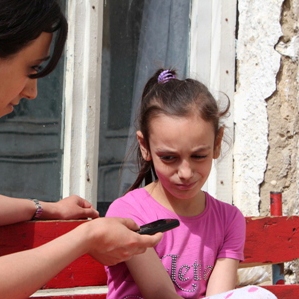 – The Armenians are our enemies. They are bad people. They kill people. They want to take our lands from us. They want to kill the population, the children. My mother has told me.
– The Armenians are our enemies. They are bad people. They kill people. They want to take our lands from us. They want to kill the population, the children. My mother has told me.
– Which of our national heroes do you know?
– I know Mubariz. Armenians live in Lachin now. If I meet an Armenian child, I will kill him.
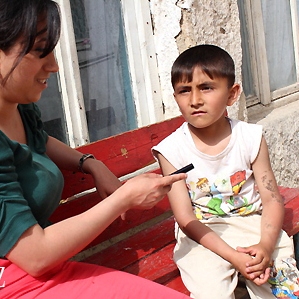 The youngest of them, preschool child Aykhan has not decided to kill an Armenian child, but said that he will beat him in revenge.
The youngest of them, preschool child Aykhan has not decided to kill an Armenian child, but said that he will beat him in revenge.
1 Ay bala is a form of address – "sonny," "my child," "daughter"
…Simultaneously with the events in Shushi, the Azerbaijanis smashed several Armenian villages. On June 5, an armed unit under the command of Sultan-bek Sultanov (governor’s brother) slaughtered the village of Gayballu (Armenian – Gaybalushen, was also known as Kaybalukend), which, as the English highlighted, “was just near Shushi in sight from Sultanov’s house.” According to the information of the English, out of 700 residents of the village, 11 men and 87 women and children survived. The Azerbaijani officer who stopped the pogroms of two Armenian settlements was punished by Sultanov. Relying on these facts, representative of English command, colonel Cloterberg in his report demanded to bring Sultanov to justice >>
It should be taken into consideration that the author writes about the Soviet period when cases like this could not remain unnoticed, because from 1991, the moment of blockade and artillery shellings of Stepanakert by Azerbaijan, the Azerbaijanis could hardly be treated at “Khankendi” hospitals


